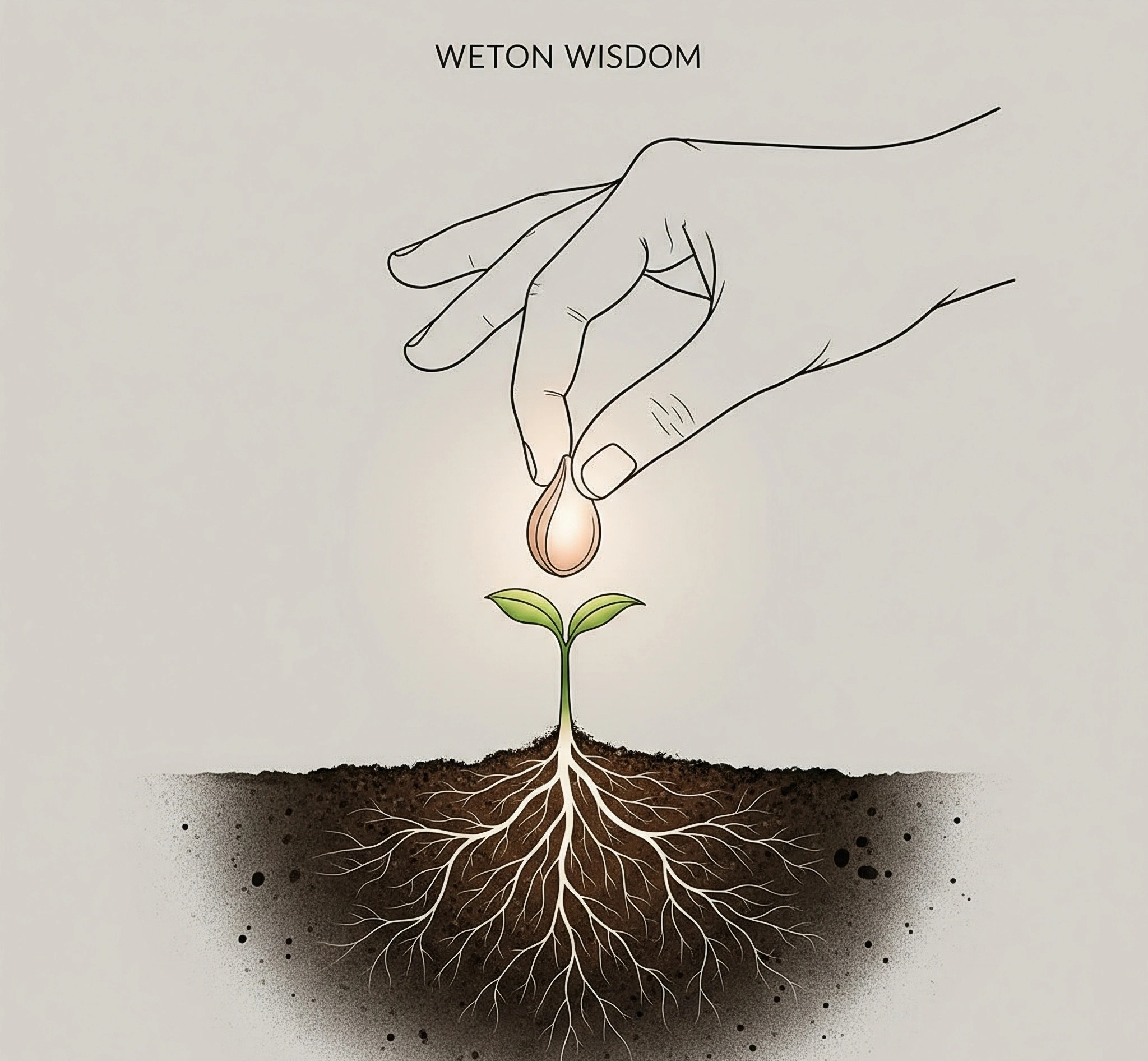Weton Your Introduction to Javanese Wisdom
In a world increasingly seeking mindfulness and personal connection, ancient wisdom traditions offer valuable pathways. The Javanese Weton system, often perceived as complex or esoteric, is in fact a remarkably accessible framework for understanding oneself and navigating daily life with greater intention. Far from being a mere fortune-telling tool, Weton provides a foundational guide to the subtle energies that influence our days. Consequently, this article serves as your beginner’s guide, simplifying its core principles and offering practical steps to explore this rich spiritual heritage.
 Weton’s Building Blocks: The Javanese Calendar Explained
Weton’s Building Blocks: The Javanese Calendar Explained
At its core, Weton is a combination of two ancient Javanese calendar cycles: the seven-day week (Saptawara) and the five-day market cycle (Pancawara). When these two cycles meet, they form a unique Weton for each day, each with a specific numerical value called “Neptu.” Understanding these basic components is your first step.
The Saptawara (Seven-Day Week):
This is familiar to most: Minggu (Sunday), Senin (Monday), Selasa (Tuesday), Rabu (Wednesday), Kamis (Thursday), Jumat (Friday), Sabtu (Saturday). Each day carries a specific Neptu value:
- Minggu: 5
- Senin: 4
- Selasa: 3
- Rabu: 7
- Kamis: 8
- Jumat: 6
- Sabtu: 9
The Pancawara (Five-Day Market Cycle):
Unique to the Javanese calendar, these are: Legi, Pahing, Pon, Wage, Kliwon. Each also has a Neptu value:
- Legi: 5
- Pahing: 9
- Pon: 7
- Wage: 4
- Kliwon: 8
Calculating Your Weton Neptu:
To find a Weton’s Neptu, you simply add the Neptu values of the day and the market day. For example, for “Senin Legi,” you add Senin (4) + Legi (5) = 9. This number, 9, is the Neptu for Senin Legi. Ultimately, this Neptu value is a simple yet powerful indicator of the day’s inherent energy.
Weton in Practice: Simple Daily Uses
The Weton system is not just about numbers; indeed, it’s a practical tool woven into the fabric of Javanese life. For beginners, its most straightforward applications lie in understanding personal tendencies and identifying general auspiciousness for daily activities.
Understanding Your Birth Weton:
Your birth Weton (the Weton on the day you were born) is often seen as a blueprint for your personality. It suggests certain traits you might possess, thereby offering a basic self-awareness tool. For example, some Wetons are associated with calmness, while others are linked to determination.
Simple Auspicious Days (Dina Apik Sederhana):
Weton can guide simple daily decisions. Certain Wetons are generally considered more favorable for starting new tasks, making small purchases, or engaging in social activities. This isn’t about rigid rules; instead, it’s about aligning with a perceived positive flow.
Common Misconceptions for Beginners:
It’s crucial to understand that Weton is a guide, not a strict prophecy. It doesn’t dictate your future. Rather, it provides insights into potential energies. Therefore, avoid over-interpreting or using it for complex, life-altering decisions without deeper study or guidance from experienced practitioners. Ultimately, it’s a system for subtle awareness, not absolute prediction.
Your First Weton Step: Finding an Auspicious Study Time
Let’s imagine a student, “Bima,” who is new to Weton and wants to pick the best day to start a new, challenging study project. Bima knows his birth Weton is “Rabu Kliwon” (Rabu 7 + Kliwon 8 = 15), which is generally associated with intelligence and strong opinions. He has two potential days to start: a “Senin Wage” (Senin 4 + Wage 4 = 8) or a “Kamis Pon” (Kamis 8 + Pon 7 = 15).
Bima’s Initial Approach:
Bima initially just looks up “good days for studying” online. He finds that Kamis Pon is sometimes cited as a good day for learning due to its higher Neptu. However, he also feels a bit overwhelmed by the sheer amount of information. Consequently, he decides to simply consider the Neptu values and his own feeling.
Applying Weton for Decision Making:
He reflects on his birth Weton, Rabu Kliwon (15). He knows he tends to be focused but also can get stuck on details.
- Senin Wage (Neptu 8): This day feels a bit more relaxed to him. Perhaps it suggests a calmer start, given its lower Neptu.
- Kamis Pon (Neptu 15): This day has a high Neptu, similar to his own birth Weton. He thinks this might mean a day of intense focus, but also potentially more pressure.
Instead of seeking a definitive “best day,” Bima decides to use Weton as a prompt for intentional planning. He chooses Senin Wage to *begin* his study project, aiming for a calm, steady start. Furthermore, he plans to use Kamis Pon later in the week for a more intensive, deep-dive study session, leveraging its higher energy for focused work. This simple experiment, therefore, helps him understand Weton not as a command, but as a gentle suggestion for aligning his energy with the day’s potential.
Beyond Prediction: Weton for Daily Self-Awareness
The true “open code” moment for beginners in Weton is realizing its function as a daily mindfulness prompt. It’s not about complex predictions; rather, it’s about simple, consistent self-awareness.
Beyond Fortune-Telling:
Many approach Weton seeking definitive answers about their future. However, its deeper value lies in prompting you to ask, “How can I best engage with today’s energy?” This shifts the focus from passive reception to active participation in your day.
A Gentle Reminder for Intentional Living:
Each Weton has a general character. Knowing this provides a subtle nudge. For instance, if today is a Weton associated with “creativity,” you might consciously try to find a creative outlet. Conversely, if it’s a “calm” Weton, perhaps you plan for more reflective activities. It’s a simple, daily check-in with yourself and the environment. This makes Weton a practical tool for cultivating mindfulness. It encourages you to be present and to align your actions with the subtle flow of the day.
A Simple Framework for Weton in Daily Life
For those just starting, integrating Weton into daily life can be straightforward. Here’s a simple framework:
1. Morning Weton Check:
- Action: Each morning, quickly check today’s Weton (e.g., “Rabu Pahing”).
- Reflection: Think about the basic characteristics often associated with that Weton (e.g., “Rabu Pahing: often seen as thoughtful and independent”).
- Question: “What kind of energy does this Weton suggest for my day?”
2. Daily Intention Setting:
- Action: Based on the Weton’s energy, set a small intention for your day.
- Example: If it’s a “harmonious” Weton, intend to foster good relationships. Alternatively, if it’s an “active” Weton, plan to tackle a demanding task.
- Question: “How can I align my main activity today with this Weton’s energy?”
3. Evening Reflection:
- Action: Before bed, briefly reflect on your day.
- Learning: Did you notice the Weton’s influence? How did your intention play out?
- Question: “What did I learn about today’s Weton and my own responses?”
This simple, iterative process allows you to gradually build a deeper understanding and connection with Weton wisdom. It transforms Weton from a passive fortune-telling system into an active tool for self-awareness, strategic planning, and continuous personal development. Ultimately, it’s about leveraging ancient wisdom as a dynamic input for your daily “operating system.”
 EMBRACING THE JOURNEY OF JAVANESE WISDOM
EMBRACING THE JOURNEY OF JAVANESE WISDOM
The Javanese Weton system, far from being a relic of the past, offers a profound framework for understanding the subtle energies that shape our lives. As a “Digital Architect,” I see parallels between optimizing complex technological systems and harmonizing our personal journeys with these ancient rhythms. Ultimately, it’s about moving beyond superficial interpretations. It means truly deconstructing the “code” of traditional wisdom, thus revealing its inherent logic and practical application.
By embracing Weton not as a rigid set of rules, but as a psycho-spiritual algorithm for self-calibration and intentional living, we can unlock a deeper connection to ourselves and the world around us. It’s a powerful reminder that the most sophisticated insights often lie in the elegant simplicity of ancient knowledge, waiting to be rediscovered and integrated into our modern lives. The daily Weton check becomes more than just a fortune. Instead, it transforms into a moment of mindful connection. It’s a strategic pause to align ourselves with the flow of the cosmos.